- Who We Are
- Clinician Employment
- Publications
- Witness to Witness (W2W)
- El Premio Kugel & Zuroweste a la Justicia en la Salud
- Your Voice Matters: Photovoice Project
Scholarship: Underserved Occupational Populations Section Resident and Student Scholarship
Application Deadline: 04/15/2018 at 5 pm CST
The Underserved Occupational Populations Section of ACOEM is sponsoring one $1,000 scholarship to qualified residents and medical students interested in making significant contributions to the field of underserved occupational medicine.The scholarship was established in honor of Joseph A. Fortuna, MD, FACOEM who founded the Underserved Occupational Populations Section of ACOEM and who was a tireless supporter of underserved workers and their families.
Files
-
- JAF Memorial Scholarship to AOHC.3 ( 291 Kb )
Taking A Pulse: Migrant Clinicians Network 2018 Poll Results
This new poll, taken by Migrant Clinicians Network in January and February 2018, reflected the experiences of clinical staff from 26 states across the country. Respondents came from every corner of the clinic; occupations listed include Physician, Executive Director, Dental Assistant, Outreach Specialist, Therapist, Community Health Worker, Registered Nurse, and 24 other occupations. The poll follows up on MCN’s 2017 poll, in which 63 percent of respondents indicated that immigrant and mobile patients’ attitudes and feelings toward health care access had changed.
This new poll, taken by Migrant Clinicians Network in January and February 2018, reflected the experiences of clinical staff from 26 states across the country. Respondents came from every corner of the clinic; occupations listed include Physician, Executive Director, Dental Assistant, Outreach Specialist, Therapist, Community Health Worker, Registered Nurse, and 24 other occupations. The poll follows up on MCN’s 2017 poll, in which 63 percent of respondents indicated that immigrant and mobile patients’ attitudes and feelings toward health care access had changed.
Files
-
- Poll Results February 2018 ( 95 Kb )
WEBINAR | Improving Patient Adherence with Cost of Care Conversations
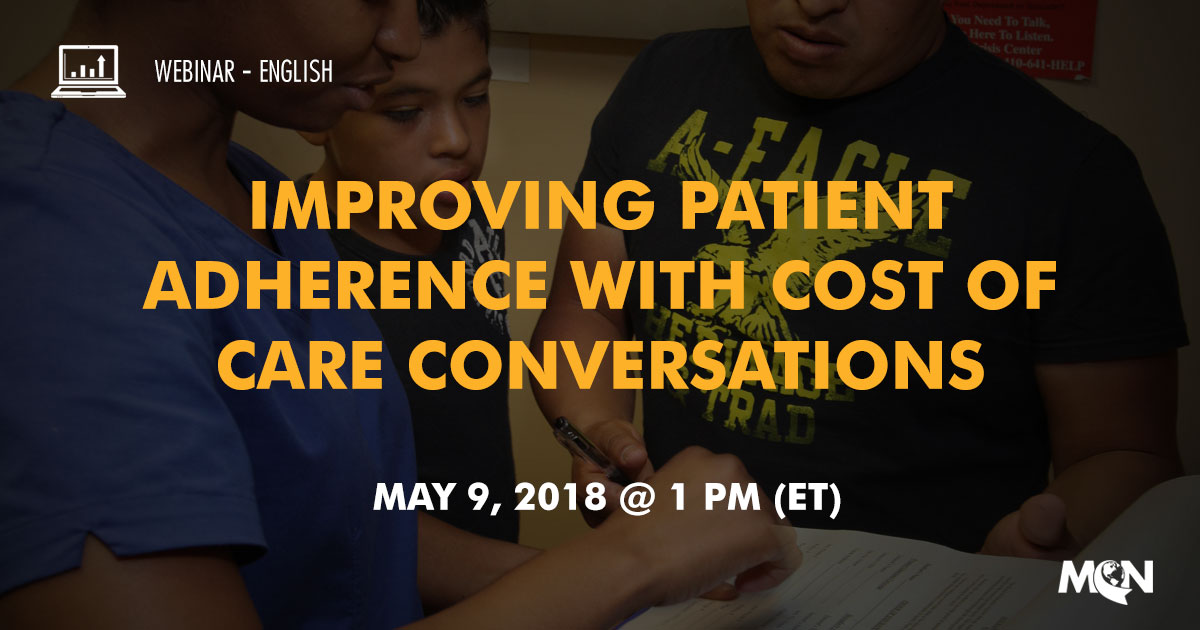
DATE: May 9, 2018, 1 pm (ET)
SPEAKERS: Deliana Garcia, MA, Douglas D. Bradham, DrPH, MA, MPH
Continuing Education Credit
To receive CME* or CNE credit after viewing this webinar, you must:
- Complete the Participant Evaluation associated with this webinar
- Send an email with your first and last name stating which webinar you completed to contedu@migrantclinician.org
Description
Over 20 million people this year will not stick to their care plan because of worry about the cost -- almost 6% of the entire US population. But avoiding or delaying care, especially for chronic conditions or in prenatal care, can have adverse effects on health status and health care use -- and long-term expense. When providers talk to their patients about the cost of their care, what is recalled by the patient? How can providers present the cost of care conversation in a way that is the most effective?
In this presentation, MCN will discuss a unique project examining the cost of care conversation’s structure, to see what content elements are actually delivered during the medical encounter versus what is recalled by the patients. The presentation will include a comparison of the effectiveness of the trained sub-groups (intervened) and the usual care (non-intervened) study groups. Long-term outcomes regarding the patient’s adherence to the care plan, and their reason for non-adherence, will also be discussed.
Learning Objectives
- To introduce the concept and motivation of initiating Cost of Care Conversations in communityhealth centers’ primary care delivery processes.
- To explain the elements of Cost of Care Conversations and how they might improve adherence to care plans by increasing shared decision-making between patients, clinicians, and clinic staff members.
- To encourage discussions among the clinic staff and clinical teams of: who, what, when, and how these Cost of Care Conversations can efficiently and effectively be delivered.
Files
WEBINAR | ¡Es su derecho saber! Ayudando a los Promotores de Salud Comunitarios a promover la seguridad química en el trabajo (2/7/18)
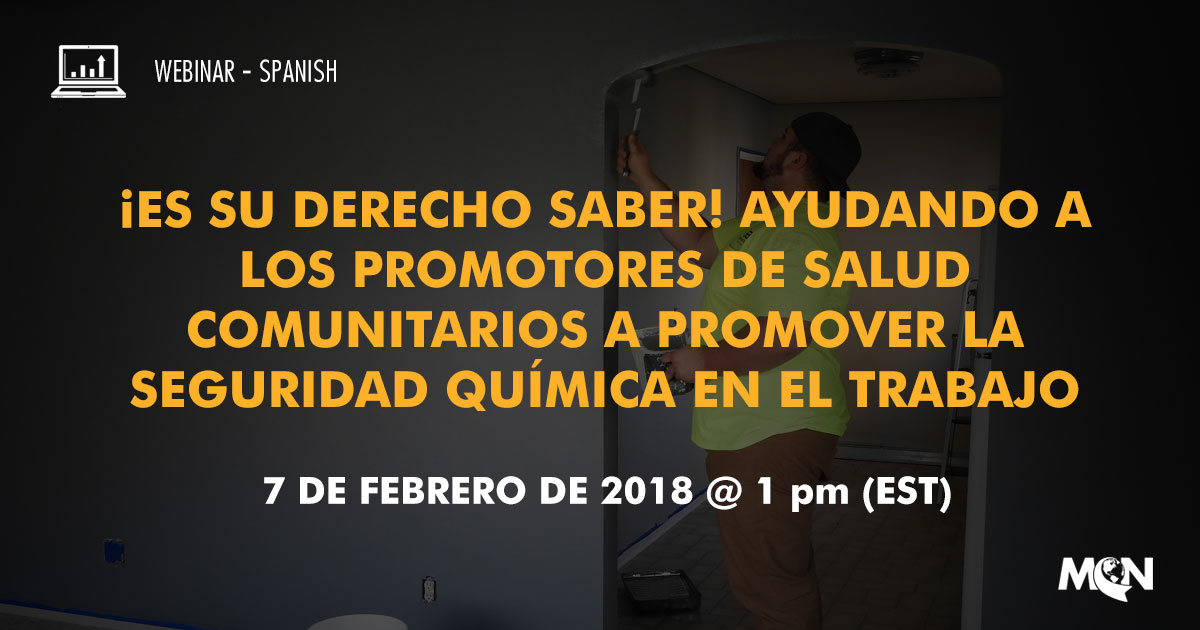
FECHA DE GRABACION: 7 de febrero de 2018 @ 1 pm (ET)
Crédito de educación continua
Para recibir credito de Trabajador/a de Salud Comunitaria o Educacion de Continua de Enfermera después de ver alguno de estos seminarios usted debe hacer lo siguiente:
- Completar la evaluación participante asociado a cada webinar
- Enviar un correo electrónico con su nombre y apellido indicando que ha completado a contedu@migrantclinician.org
Descripción
Millones de trabajadores están expuestos a diferentes químicos diariamente en sus trabajos. Todo trabajador tiene el derecho de saber sobre los químicos que utiliza en su trabajo y los promotores de salud comunitarios pueden ser una fuente muy importante de información y apoyo para los trabajadores. Este seminario virtual mostrará a los promotores de salud comunitarios como explicar lo que pasa cuando una persona se expone a químicos y como los trabajadores pueden protegerse a sí mismos.
Files
2017 Global Report on Internal Displacement
"The Global Report on Internal Displacement presents the latest information on internal displacement worldwide caused by conflict, violence and disasters."
Files
Treating Fear: Sanctuary Doctoring
"These materials are designed to be simple and useful in helping physicians and health-care professionals to meet the needs of their patients who may be undocumented or suffering stresses related to close family or community members being undocumented. While there are many toolkits being developed, we hope that these materials might be very easy to use and enable the physician or other health-care professional to address the most immediate needs of such patients."
Files
WEBINAR | The Role of Structural Competency in the Treatment and Prevention of Diabetes in a Vulnerable Agricultural Worker Population
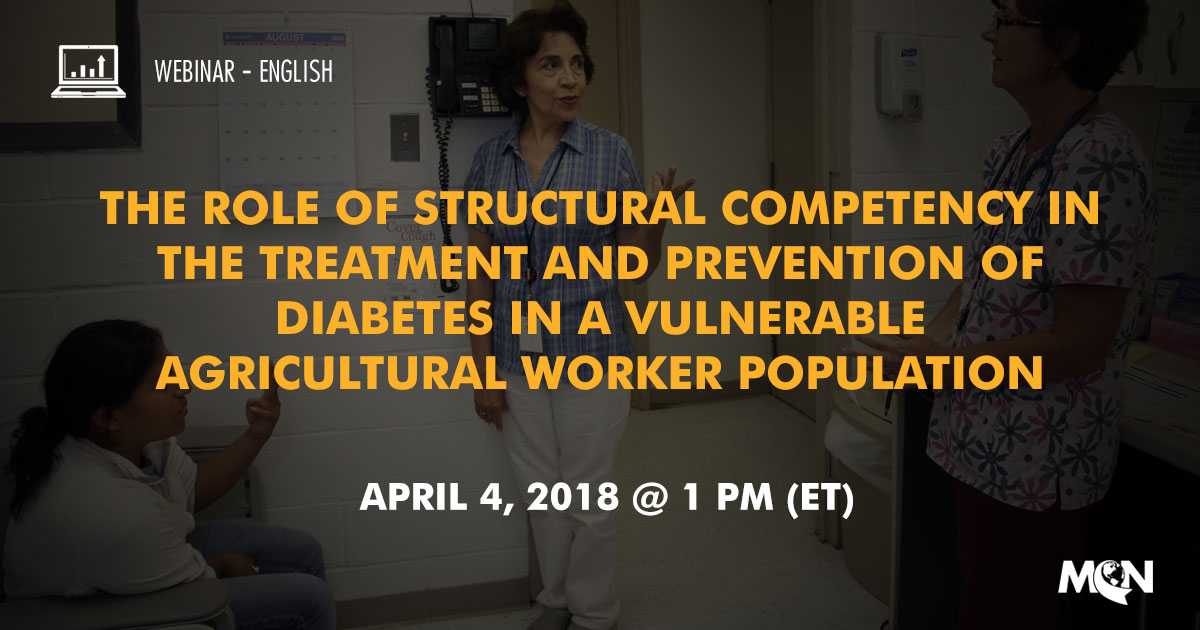
DATE: April 4, 2018, 1 pm (ET)
SPEAKERS: Deliana Garcia, MA
Continuing Education Credit
To receive CME* or CNE credit after viewing this webinar, you must:
- Complete the Participant Evaluation associated with this webinar
- Send an email with your first and last name stating which webinar you completed to contedu@migrantclinician.org
Description
Over the last 30 years, considerable attention has been paid in the clinical setting to cultural competency- the ability to mitigate against the effects of the sociocultural differences between clinicians and patients and to take into account how culture affects the symptoms presented or the patients’ attitude about health care. More recently, scholars and clinicians have encouraged those in practice or health professions training to focus not only on the behaviors and beliefs of cultural groups but more importantly to consider the structural determinants, prejudices, injustices and blind spots, the “pathologies of social systems” that affect health outcomes and the stigma experienced by patients. The session will introduce participants to the broad framework of structural competency and the five core structural competencies. Particular attention will be paid to the impact of structural issues on the treatment and management of diabetes for vulnerable populations.
Learning Objectives
- Identify the structures that shape clinical interactions;
- Discuss the means of developing an extra-clinical language of structure;
- Rearticulate “cultural” formulations in structural terms;
- Explain the process of observing and imagining structural interventions; and
- Discuss the impact of structural issues on diabetes care for vulnerable populations.
This project is supported by the Health Resources and Services Administration (HRSA) of the U.S. Department of Health and Human Services (HHS) under cooperative agreement number U30CS09742, Technical Assistance to Community and Migrant Health Centers and Homeless for $1,094,709.00 with 0% of the total NCA project financed with non-federal sources. This information or content and conclusions are those of the author and should not be construed as the official position or policy of, nor should any endorsements be inferred by HRSA, HHS or the U.S. Government.
Files
WEBINAR | The Impact of the Workplace on Primary Care Management of the Diabetic Patient
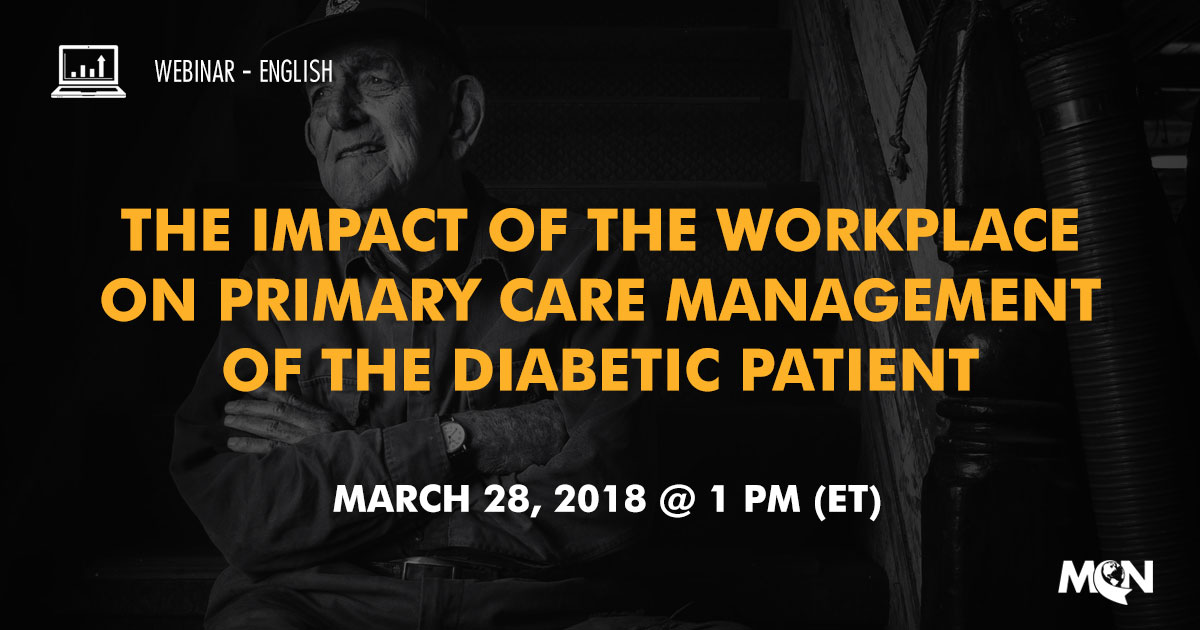
DATE: March 28, 2018, 1 pm (ET)
SPEAKERS: Sherry Barron
Continuing Education Credit
To receive CME* or CNE credit after viewing this webinar, you must:
- Complete the Participant Evaluation associated with this webinar
- Send an email with your first and last name stating which webinar you completed to contedu@migrantclinician.org
Description
Management of diabetes can be affected by many factors including the type of job of the diabetic patient. More importantly, poor diabetes management can compromise a workers’ ability to perform their job duties. The standard of care to regulate blood glucose such as standardized medication, activity, and food regimens may not be possible for many workers, particularly those in low-wage jobs. There may be no place to store medication or food, breaks may be limited or not regularly be offered and following a food regimen while working may not be feasible. This webinar reviews how work can impact diabetes management and offers strategies and tools to assist diabetic patients in managing their disease at work. Results from a recent study with primary care providers will be shared to highlight new recommendations for clinical decision support.
Files
Cost of Care Resources
Files
-
- What do the Terms in Health Insurance Mean for Patients' Cost of Care? - brochure ( 548 Kb )
-
- Hablemos del seguro de salud y de los costos de servicios de salud para pacientes - folleto ( 550 Kb )
-
- Training Manual 2019 - CLEAR ON THE COST: PATIENTS AND PROVIDERS CO-AUTHORING THE CARE PLANS ( 1 Mb )
-
- Cost of Care Policy and Monitoring Procedure ( 19 Kb )
-
- Cost of Care Policy and Monitoring Procedure - Spanish ( 20 Kb )
-
- Health Insurance Terminology Slideshow ( 384 Kb )
-
- Health Insurance Terminology Slideshow - Spanish ( 358 Kb )
-
- Health Insurance Terminology Infographic ( 287 Kb )
-
- Health Insurance Terminology Infographic - Spanish ( 286 Kb )
How Typical Health Insurance Works
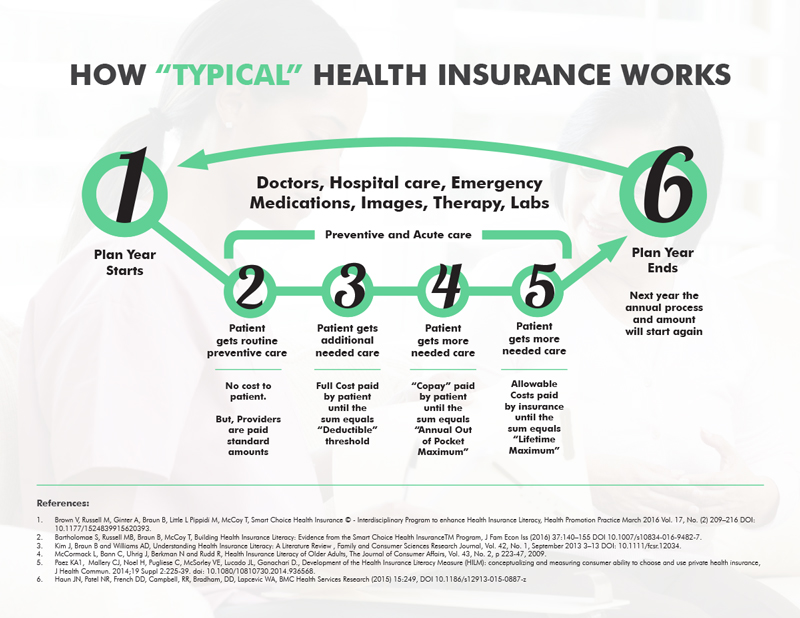
An infographic illustrating the cycle of how "typical" health insurance works.
Files
-
- How Typical Health Insurance Works ( 463 Kb )




